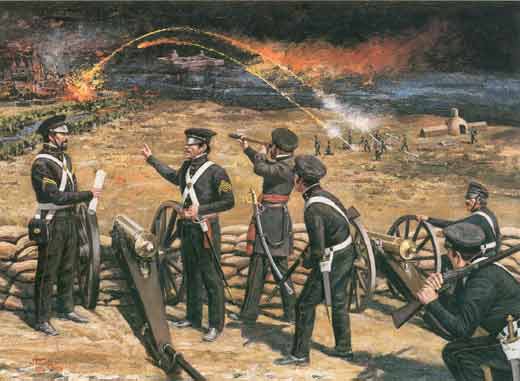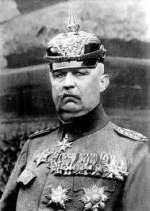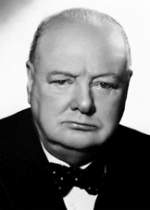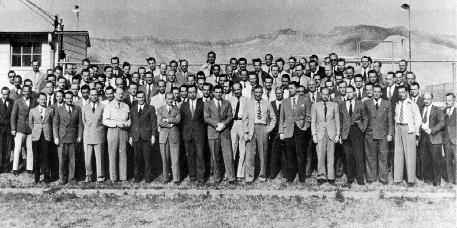

1847 Rocketry: At the siege of Veracruz, the new US rocket battery is used against the Mexican Army for the first time. [See: Wunderwaffen: Hitler's Deception and the History of Rocketry.]

1893 Birth: Emmy Goering: Hermann Goering's second wife (1935): An actress, who will use the stage-name "Emmy," she will be sentenced to one year in a labor camp and five years performance ban. Thirty percent of her private assets will be seized after the war.
1894 Birth: Edmund Hitler: Adolf Hitler's younger brother, in Passau, Germany, near the Austrian border. [For further details, Click here.]
1897 Birth: Wilhelm Reich: Jewish-Austrian psychiatrist, psychoanalyst, and author, who was trained in Vienna by Sigmund Freud. In the 1930's, Reich said he had discovered a physical energy, which he called "orgone" and which he said was contained in the atmosphere and in all living matter. He developed instruments to detect and harness this energy, which he said could be used to treat illnesses like cancer or control the weather. His views were not accepted by the mainstream scientific community. His first book, Character Analysis, is still a major psychoanalytical text. When his second book, The Mass Psychology of Fascism, was banned by the Nazis in 1933, and German newspapers called him a communist and a Jew who advocated free love, Reich realized he was in danger and left Germany, first settling in Scandinavia, then in 1939 in the United States, where he continued his orgone research. In 1947, following a series of articles about orgone in The New Republic and Harper's, the US Food and Drug Administration (FDA) began an investigation into Reich's claims about orgone therapy, and won an injunction against its promotion as a medical treatment. Charged with contempt of court for violating the injunction, Reich conducted his own defense, which involved sending the judge all his books to read.
1916 World War I: Various:
War at Sea: German U-boats torpedo another passenger ship, the Sussex, and several more Americans are killed, despite Germany's guarantees of 1915.
Gefreiter Adolf Hitler endures trench warfare in Flanders (Artois) with 3 Company, 16 Reserve Infantry Regiment [List Regiment]. [For further details, Click here.]

1917 World War I: The Sixtus Letter‑-a secret letter sent by Karl I, Emperor of Austria‑-attempts to negotiate a separate peace with England and France. Karl willingly offers to recognize France's 'just demand' in regard to Alsace-Lorraine.
Throughout 1917, top-secret attempts had been made to conclude a separate peace with the Habsburg monarchy, encouraged by the indications of the new reformist emperor Karl—Franz Josef had died in December 1916—that he was interested in doing exactly that. The most serious of these peace feelers was communicated to the Entente via Karl's cousin Prince Sixte of Bourbon-Parma, a serving officer in the Belgian army, in the spring of 1917 when the French Nivelle Offensive had just collapsed on the Western Front. The British prime minister David Lloyd George had high hopes for the conversations, which foundered when the Italian foreign minister Sidney Sonnino refused point-blank to countenance any agreement.
1918 World War I: German forces cross the Somme River:

On March 24, 1918, German forces cross the Somme River, achieving their first goal of the major spring offensive begun three days earlier on the Western Front. Operation Michael, engineered by the German chief of the general staff, Erich von Ludendorff, aimed to decisively break through the Allied lines on the Western Front and destroy the British and French forces. The offensive began on the morning of March 21, 1918, with an aggressive bombardment. [For further details, Click here.]
1933 Various:
Press Reaction to Hitler's March 23 Speech:
Hitler's speech produced no surprises. He spoke very moderately, in order to wipe out the bad impression that his former methods had created abroad. He declared that he would enter the Four Power Pact and come to a compromise with France. It remains to be seen how these promises will be acted upon. With Hitler's speeches one must always seek what is hidden between the lines.—Le Temps
More Press Reaction to Hitler's March 23 Speech:
As to the main lines of German foreign policy, there can be clearly traced between the lines of his speech, which implied that Soviet Russia would not regard with more than the most cynical interest the suppression of German Communists, that his government looked for increasingly close relations with Italy, that they valued the spirit prompting British mediatory efforts.—The Times (London)
Church and Reich: Monsignor Kaas leaves Berlin for a brief visit to Rome, supposedly to discuss problems in the former German territory of Eupen-Malmedy. THP)
Anti-Nazi Boycott: The World Alliance for Combating Anti-Semitism calls for a boycott of German goods and services, to last until the Nazis stop persecuting German Jews. (THP) [See: Was Adolf Hitler an Insecure Dictator?]
1934 Tydings-McDuffie Act: The United States grants the Philippine Islands independence. The Tydings-McDuffie Act provided for the drafting and guidelines of a Constitution for a 10-year "transitional period" which became the government of the Commonwealth of the Philippines before the granting of Philippine independence, during which the US would maintain military forces in the Philippines. Furthermore, during this period the American President was granted the power to call into military service all military forces of the Philippine government. The act permitted the maintenance of US naval bases, within this region, for two years after independence. The act reclassified all Filipinos that were living in the United States as aliens for the purposes of immigration to America. Filipinos were no longer allowed to work legally in the US, and a quota of 50 immigrants per year was established. Because of the Japanese invasion of the Philippines in 1941 and World War Two, Philippine Independence was delayed until July 4, 1946.
1935 Boycott: The Anglo-Jewish Council of Trades and Industries, the World Alliance for Combating Anti-Semitism and the British Anti-War Council proclaim an anti-Nazi boycott. (THP)
1938 Various:
Refugees: The United States: asks that all powers help refugees fleeing from the Nazis. [See: Was America Complicit in the Holocaust?]
Euthanasia: Professor Kleist, a psychiatrist, ends his report on the German mental hospital in Herborn, where 'euthanasia' by starvation is being practiced, with these sentences: 'As long as there is no law for the destruction of lives unworthy to be lived, those who are beyond cure have the right to humane treatment which assures their continued existence. The expenditure on these unfortunates should not fall below an acceptable minimum level.' (THP)
Winston Churchill addresses the House of Commons:
Let me give a warning drawn from our recent experiences. Very likely this immediate crisis will pass, will dissipate itself and calm down. After a boa constrictor has devoured its prey it often has a considerable digestive spell. It was so after the revelation of the secret German air force. There was a pause. It was so after German conscription was proclaimed in breach of the Treaty. It was so after the Rhineland was forcibly occupied. The House may recall that we were told how glad we ought to be because there would be no question of fortifying it. Now, after Austria has been struck down, we are all disturbed and alarmed, but in a little while there may be another pause. There may not—we cannot tell. But if there is a pause, then people will be saying, "See how the alarmists have been confuted; Europe has calmed down, it has all blown over, and the war scare has passed away."
The Prime Minister will perhaps repeat what he said a few weeks ago, that the tension in Europe is greatly relaxed. The Times will write a leading article to say how silly those people look who on the morrow of the Austrian incorporation raised a clamour for exceptional action in foreign policy and home defence, and how wise the Government were not to let themselves be carried away by this passing incident.
All this time the vast degeneration of the forces of Parliamentary democracy will be proceeding throughout Europe. Every six weeks another corps will be added to the German army. All this time important countries and great rail and river communications will pass under the control of the German General Staff. All this time populations will be continually reduced to the rigours of Nazi domination and assimilated to that system. All this time the forces of conquest and intimidation will be consolidated, towering up soon in real and not make-believe strength and superiority. Then presently will come another stroke. Upon whom? Our questions with Germany are unsettled and unanswered. We cannot tell. What I dread is that the impulse now given to active effort may pass away when the dangers are not diminishing, but accumulating and gathering as country after country is involved in the Nazi system, and as their vast preparations reach their final perfection.
1939 Poland: Miuroslav Arciczewski, the Polish Undersecretary of State, complains to the German Ambassador about British and French intrigues in Warsaw, 'which don't take into consideration the dangers to which Poland is exposed.' (THP)

1941 World War II: North Africa: Erwin Rommel launches another offensive in Libya and quickly captures El Agheila. [See: The Mediterranean Strategy.]
1942 Various:
Holocaust: 320 German Jews are deported from Wuerzburg to the death camp at Belzec. Not a single one survives. Note: Throughout March, Jews are deported to Belzec from Eastern Galicia and the Lublin area, where within two weeks almost all of the city's large Jewish community is transported. (THP) [See: Was the Holocaust Detrimental to Hitler's War Effort?]
Holocaust: The first Slovak Jews are deported to Auschwitz. (THP)
1944 World War II: Various:
Wingate dies in Burma:
On this day, Maj. Gen. Orde Wingate, leader of the 77th Indian Brigade, also called the Chindits, dies in a transport plane crash. He was 41 years old.
Wingate, a graduate of the Royal Military Academy, was a famous eccentric who both quoted the Bible and advocated irregular warfare tactics. His career as a guerrilla fighter began as he organized Jewish underground patrols to beat back Arab raids in British-controlled Palestine in the 1930s. In 1941, Wingate led a mixed Ethiopian and Sudanese force in retaking Addis Ababa, the capital of Ethiopia, from the Italians, who had invaded in 1935.
Upon the beginning of Japan's China-Burma campaign, Wingate was sent to India to employ his experience as a guerrilla fighter and organize what became known as the Chindits—a brigade of specially trained Gurkha (Nepalese), Burmese, and British troops. The Chindits were composed of two units of Long Range Penetration Groups, each made up of men-and mules. Wingate and his brigade entered Japanese-controlled Burma from the west, crossed the Chindwin River, and proceeded with sabotage activity: sneakily penetrating Japanese-held territory, attacking supply lines, and cutting communications. Once in the field, the Chindits were cut off from other units and could be supplied only by airdrops.
One of the most effective Chindit attacks was against the Mandalay-Myitkina railway, when they blew up three bridges while also beating back Japanese troops determined to stop the demolitions. The Chindits continued to wreak havoc—at one point killing 100 Japanese soldiers while suffering only one loss themselves—until a lack of supplies and troublesome terrain forced them back to India.
On the night of March 24, Wingate boarded a transport plane at the Broadway Base in Burma, destined for India. The pilot had complained earlier about the performance of one of the plane's twin engines, but after Wingate talked with the aircrew, a decision was made to take off. The plane never made it to India. The crash was so violent that virtually none of Wingate's remains were found.
British Prime Minister Winston Churchill eulogized Wingate before the House of Commons that August: "There was a man of genius who might well have become also a man of destiny. He has gone, but his spirit lives on in the long range penetration groups, and has underlain all these intricate and daring air operations and military operations based on air transport and on air supply." (History.com)
Italy: The Gestapo rounds up innocent Italians in Rome and shoots them to death in reprisal for a bomb attack that killed 33 German policemen.

Great Escape: The greatest mass escape of World War II (Great Escape) occurs at Stalag Luft III when 76 allied airmen tunnel out. Only 3 eventually make it home; many are massacred when caught.

I expressed the opinion that if the British airmen were to be shot, (a) there would be a breach of the Geneva Convention, (b) reprisal measures endangering the lives of German airmen held by the British as prisoners of war would have to be expected. I asked General Forster to bring the matter to the notice of the Reich Marshal even at this very late stage, and to stress those two points. General Forster was immediately prepared to do this. When it came to the choice of the way in which the matter could be brought to the attention of the Reich Marshal, it was decided to report to State Secretary Field Marshal Milch. In my presence General Forster rang up the office of the state secretary and obtained the interview at once. General Forster left the room, and while doing so he instructed me to wait for his return in his study. After some time General Forster came back and told me that he had reported the matter to the state secretary and that Field Marshal Milch had made the necessary notes. [For further details, Click here.]
1945 World War II: FDR forbids his staff to say anything about Soviet guilt for Katyn:

The Katyn Forest massacre was a criminal act of historic proportions and enduring political implications. When Nazi occupation forces in April 1943 announced the discovery of several mass graves, propaganda minister Josef Goebbels hoped that international revulsion over the Soviet atrocity would drive a wedge into the Big Three coalition and buy Germany a breathing space, if not a victory, in its war against Russia. (A headline in the May 1943 Newsweek read: "Poles vs. Reds: Allied Unity Put to Test Over Officer Dead.") But Goebbels miscalculated. Despite overwhelming evidence of Soviet responsibility, Moscow blamed the Germans, and for the rest of the war Washington and London officially accepted the Soviet countercharge. When the Polish government-in-exile in London demanded an international inquiry, Stalin used this as a pretext to break relations. The Western allies objected but eventually acquiesced. Soon thereafter, the Soviet dictator assembled a group of Polish Communists that returned to Poland with the Red Army in 1944 and formed the nucleus of the postwar government. Stalin's experience with the Katyn affair may have convinced him that the West, grateful for the Red Army's contribution to the Allied military effort, would find it hard to confront him over Poland after the war.

1957 Wunderwaffen: W. A. Higenbotham, the executive secretary of the Federation of American Scientists, writes a letter to President Truman demanding that the German scientists of Operation Paperclip be denied jobs in private industry or higher education:
Any favor extended to such individuals, even for military reasons represents an affront to the people of all countries who so recently fought beside us, to the refugees whose lives were shattered by Nazism, to our unfortunate scientific colleagues of former occupied lands, and to all those others who suffered under the yoke these men helped to forge . . . . [The] wholesale importation of scientists is not in keeping with the best objectives of America and foreign policy.
1958 Elvis Presley is inducted into the U.S. Army:

When Elvis Presley turned 18 on January 8, 1953, he fulfilled his patriotic duty and legal obligation to register his name with the Selective Service System, thereby making himself eligible for the draft. The Korean War was still underway at the time, but as a student in good standing at L.C. Humes High School in Memphis, Elvis received a student deferment that kept him from facing conscription during that conflict's final months. Elvis would receive another deferment four years later when his draft number finally came up, but this time for a very different reason: to complete the filming of his third Hollywood movie, King Creole. With that obligation fulfilled, Uncle Sam would wait no longer. On March 24, 1958, Elvis Presley was finally inducted, starting his day as the King of Rock and Roll, but ending it as a lowly buck private in the United States Army.
Elvis's manager, "Colonel" Tom Parker, made sure to have a photographer on hand to document every moment of the big day, which began at Graceland before six that morning. The photos show Elvis in dark slacks, an opened-collar shirt and a tasteful plaid sports coat, preparing to depart the house with his similarly well-dressed mom and dad for the short ride to the induction center in downtown Memphis. The 23-year-old Elvis looked fantastic, of course, and his face betrayed no hint of nervousness or regret. The flat expression on Gladys Presley's face, however, and the dark circles under her eyes, hint at the emotional impact of preparing to send her only child off on a two-year stint away from home—far longer than she and Elvis had ever before been separated. This would be the last time that Elvis would see his mother in good health, as she was diagnosed with hepatitis and hospitalized later that spring during Elvis's first weekend leave. Elvis would be granted leave once again in August to attend to his mother on her death bed. Gladys Presley passed away on August 16, 1958, and four weeks later, Elvis shipped out to Germany.
There would be other huge changes in Elvis's life during his two years in the Army. He would meet a 14-year-old Priscilla Beaulieu while in Germany, and he would watch while a new crop of teen idols took over the limelight on the U.S. pop scene. In the spring of 1960, Elvis would return to his rightful throne, but his Army years mark a clear line of separation between the Old Elvis and the New. Behind Elvis Presley lay records like "That's All Right (Mama)" and "Jailhouse Rock." Ahead of lay songs like "Aloha Oe" and "Pocketful of Rainbows," and films like Harum Scarum and Clambake.
1999 NATO bombs Yugoslavia:
On March 24, 1999, the North Atlantic Treaty Organization (NATO) commences air strikes against Yugoslavia with the bombing of Serbian military positions in the Yugoslav province of Kosovo. The NATO offensive came in response to a new wave of ethnic cleansing launched by Serbian forces against the Kosovar Albanians on March 20. [For further information, click here]
Edited by Levi Bookin (Copy editor)
levi.bookin@gmail.com
Disclaimer: This site includes diverse and controversial materials--such as excerpts from the writings of racists and anti-Semites--so that its readers can learn the nature and extent of hate and anti-Semitic discourse. It is our sincere belief that only the informed citizen can prevail over the ignorance of Racialist "thought." Far from approving these writings, this site condemns racism in all of its forms and manifestations.
Fair Use Notice: This site may contain copyrighted material the use of which has not always been specifically authorized by the copyright owner. We are making such material available in our efforts to advance understanding of historical, political, human rights, economic, democracy, scientific, environmental, and social justice issues, etc. We believe this constitutes a "fair use" of any such copyrighted material as provided for in section 107 of the US Copyright Law. In accordance with Title 17 U.S.C. Section 107, the material on this site is distributed without profit to those who have expressed a prior interest in receiving the included information for research and educational purposes. If you wish to use copyrighted material from this site for purposes of your own that go beyond 'fair use', you must obtain permission from the copyright owner.
Please Note: The list-owner and the moderator of 3rdReichStudies are not responsible for, and do not necessarily approve of, the random ads placed on our pages by our web server. They are the unfortunate price one pays for a 'free' website.